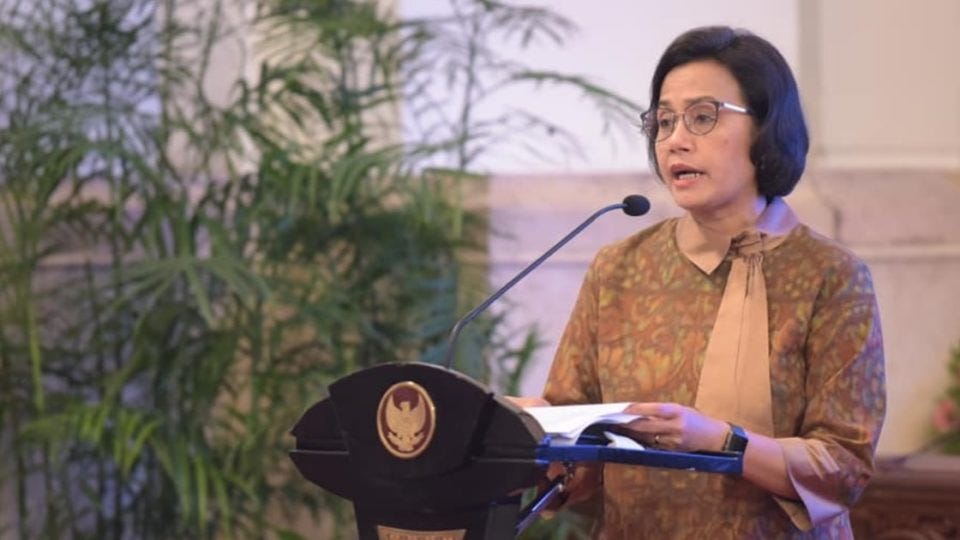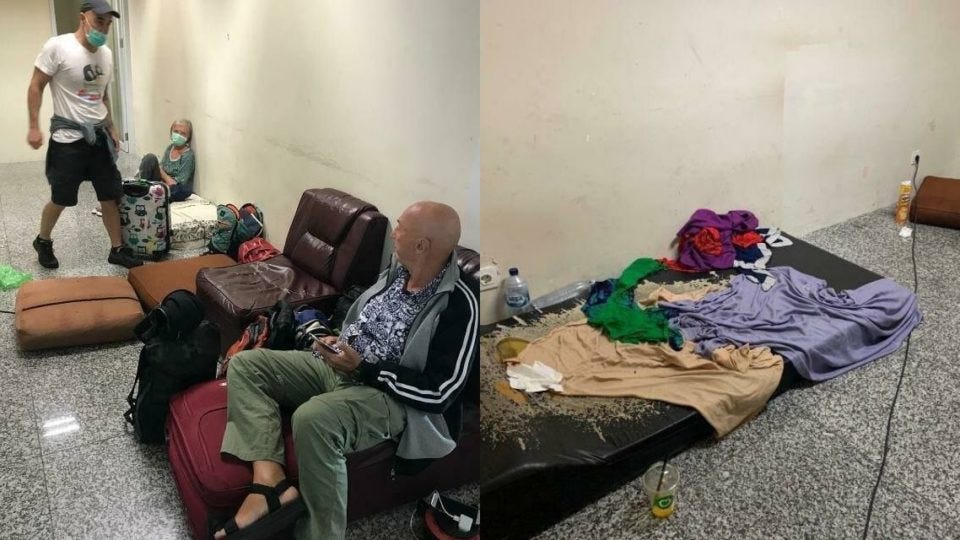Curing Indonesia's economy (March 21 - 27)
Hello Coconauts!
Today we’re checking in with the latest updates on Indonesia’s fight against the coronavirus outbreak and the impact the pandemic is having on the economy. The central bank, the Ministry of Finance and the business sector have all mounted a defense in recent weeks to soften the blow on the economy.
We’ve made today’s premium newsletter free. If you’d like to join us regularly do so here:
Please share with any interested friends or colleagues, and stay safe out there!
See you next week
The Latest

Over 100 new cases of coronavirus were announced yesterday. The 103 is the second time the new figure has surpassed 100. Achmad Yurianto, the Health Ministry spokesman focusing on the crisis, said 20 more patients had died bringing the death toll to 78. The death toll, he added, is more than double the recovered figure. "Most of the cases continue to occur in Jakarta. But we noted a significant growth in South Sulawesi, where there are 14 new cases today alone," he said. Elsewhere, Jakarta Governor Anies Baswedan noted that 50 of the new cases in Jakarta were frontline healthcare workers.
Public health experts warn the identified number of cases could be just 2 percent of the overall rate. Medical staff across the country have raised the alarm that the country could eventually see hundreds of thousands of cases, stressing an underprepared healthcare system. “I just pray and have faith so that I can stop worrying, even though sometimes that feeling (of worry) appears again,” Agnes Tri Harjaningrum, a Jakarta-based paediatrician, told the Guardian.
Recommended read:
Indonesia's health system on the brink as coronavirus surge looms (Reuters)
Other modellers are projecting that cases could rise to as many as 5 million in the capital, Jakarta, by the end of April under a worst-case scenario.
“We have lost control, it has already spread everywhere,” Ascobat Gani, a public health economist told Reuters. “Maybe we will follow Wuhan or Italy. I think we are in the range of that”.
The government says the impact of the virus will not be that severe.
“We won’t be like that,” said Achmad Yurianto, a senior health ministry official, referring to comparisons with outbreaks in Italy and China.
“What’s important is that we rally the people ... they have to keep their distance.”
The Work

More than half of Indonesian workers are employed in the informal sector, making them particularly vulnerable to economic shocks. A lockdown would leave millions without a safety net, creating a complex policy issue for the government. “A well-planned, targeted partial lockdown limiting mobility, while maintaining essential needs, is overdue. Stricter emergency measures in binding regulations are needed, besides mere appeals for social distancing,” writes Jakarta Post journalist Esther Samboh in an editorial.
Businesses will find support from the government with new bonds, loans and tax breaks on offer. Businesses must keep at least 90 percent of employees to qualify but the government is planning to keep rules lax. “The terms for the special loan will be as easy as possible, so entrepreneurs can use the credit to support their businesses,” secretary-general at the Coordinating Ministry for Economic Affairs Susiwijono told reporters.
Indonesia’s own GoJek is leading the charge for companies to protect workers. Drivers who have seen income drop dramatically as would-be riders honor social distancing advice and begin to work from home. Gojek co-CEO Andre Soelistyo announced the firm’s senior management will take a pay cut this year to fund a $6 million (Rp 100 billion) pool to support drivers.
Recommended read:
Indonesian informal workers lose work in coronavirus outbreak (Nikkei Asia Review)
Street vendors and ride-hailing drivers are good examples of informal workers. The International Labor Organization (ILO) defines informal employment as all remunerative work -- including self-employment and wage employment -- that is not registered, regulated or protected by existing legal or regulatory frameworks, as well as nonremunerative work undertaken in an income-producing enterprise. Informal workers typically do not have secure employment contracts, benefits, social protection or collective representation, according to the ILO.
Those working in the informal economy are in the bottom or lower middle-income segments of the population. Sustainable development goals set by the United Nations include transitioning out of the informal economy.
Asian economies will be seriously damaged if informal workers find themselves jobless, and this could also stir up social unrest.
The Government

Finance Minister Sri Mulyani Indrawati unveiled her $3.9 billion stimulus package last week. It’s nearly three times larger than estimated. It reinforces the diverting of the budget to prioritize procurement of healthcare machinery and accessories as the pandemic stretches across the country. The Minister also called for other ministries to rein in spending to free up further funding. Notably, funding for the tourism sector initially earmarked in the first stimulus package will be redirected to support the second stimulus. Village funds will also be redesigned.
The stimulus hasn’t impressed everybody. Former finance minister Chatib Basri told Bloomberg the government ought to relax regulations on the deficit ceiling, which would allow for a larger allocation of funds. Rizal Ramli, President Jokowi’s former Coordinating Minister for Maritime Affairs and a post-1998 crisis finance minister, recommends targeted stimulus for industries and sectors hardest hit.
Recommended reads:
COVID-19 stimulus: Learning from others (The Jakarta Post)
As of Thursday, countries have applied five types of stimuli. First, stimuli to support health services and operational funds to make lockdowns or partial lockdowns effective.
Two, direct cash aid for citizens to enable consumption and support the domestic real sector. Third, stimuli for SMEs, the hardest hit economic sector, comprising loan guarantees and avoiding layoffs. Four, providing stimuli to the most severely affected sectors on the verge of bankruptcy and that would add to unemployment.
Five, lowering interest rates and bank reserve requirements, and tax stimuli for individuals and corporations.
Investment at all costs: Jokowi fails the coronavirus test (Indonesia at Melbourne)
Jokowi has an ambitious plan to boost investment and economic growth in his second term. The government is promoting controversial “investor-friendly” omnibus laws to reform labour laws and revise the tax system, as well as several other contentious reforms, such as revisions to the Mining and Oil and Gas Laws.
Even as coronavirus was attacking China in January, Jokowi’s primary concern was still the economy. Jokowi led a cabinet meeting on 4 February in Bogor, West Java, where he noted(link is external) that as China’s economy was slowing from the effects of the virus, Indonesia should try to capitalise on the situation and increase exports to countries usually dependent on Chinese goods.
He also noted that as many tourists were avoiding China, it could be an opportunity for Indonesian tourism. In mid-February, Jokowi announced the government was planning to offer discounts of up to 30 per cent to attract domestic and foreign tourists. To the outrage of many online, the government even announced it had allocated Rp 72 billion to “influencers” to promote Indonesian tourism and encourage more foreigners to visit the country.
It should be noted that this February cabinet meeting occurred at a time when many other countries were closing or considering closing their borders. Jokowi even mentioned Covid-19 in the context of the meeting, but it was as if it was a problem for other countries to deal with. As ever, his main focus was investment and the economy.
The Central Bank

At this stage Bank Indonesia, the central bank has no plans to introduce capital controls. It says current reserves of foreign currencies are enough to weather the storm. “I have to stress that our assessment so far, we want to ensure the proper market mechanism, the proper flows - inflows and outflows - and so far we’ve managed to do that,” central bank governor Perry Warjiyo told investors on Thursday.
In the same conversation, the governor went to lengths to reassure investors the current situation will not lead to a similar crisis as seen in 1998. Banks are overall far healthier than they were in 1998 and again during the 2008 Global Financial Crisis. “We want to make sure that the situation is different than the crisis in 1998 and in 2008 as the banking industry remains healthy with low levels of non-performing loans and good financial market conditions” he added.
Perry later said foreign investment will likely remain strong in the country and that any fears are a reflection of the global economy, not Indonesia specifically. "They (foreign investors) certainly cannot be blamed for their perceptions, as all the world’s investors are panicking," he said.
Recommended read:
Enough Liquidity in Indonesia Despite $7.9b Foreign Investment Exit From Covid-19: Central Bank (The Jakarta Globe)
Indonesia has seen $7.9 billion of foreign funds fly out of the country's financial market so far this year – one of the worst capital outflows the country has ever seen – as the Covid-19 pandemic continues to stoke fears in investors' mind.
Perry Warjiyo, the governor of Bank Indonesia, the country's central bank, said the flow of foreign capital out of Indonesia this year had exceeded Rp 125 trillion ($7.9 billion), as foreign investors sold holdings in government bonds worth Rp 112 trillion and in stocks worth Rp 9.2 trillion.
"The majority of the outflow occurred in March, as much as Rp 104.7 trillion," Perry told the media via teleconference on Tuesday.
Top Coconuts Jakarta reads

Duty Calls: Working from home a privilege only some Jakartans can afford
Famed ‘es kopi’ chain Tuku launches bottled iced coffee for delivery so customers stay at home
Viral: Healthcare workers in Indonesia wear plastic raincoats for protection against COVID-19
Top Coconuts Bali reads



